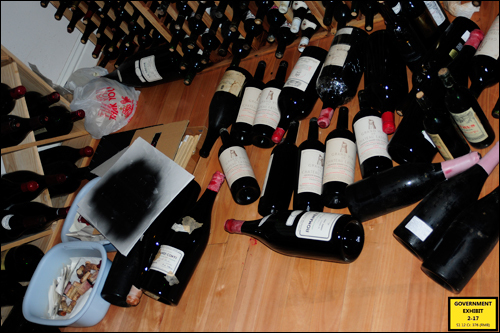Rich Dude Found Guilty Of Counterfeiting Millions’ Worth Of Rare Wines

(FBI photo)
Lots of collectors buy and sell their finds in order to finance their hobby: there’s nothing unusual about that. They just don’t normally have a room full of reprinted wine labels, corks, corking equipment, siphons, and stamps that look remarkably similar to those used to create serial numbers and other markings on vintage wine bottles.
Interestingly, it’s not a crime to counterfeit a famous collectible wine. You can plaster fake labels on bottles and give them away to your friends as much as you like. It only becomes a crime once you counterfeit wines with fraudulent intent–for example, trying to pass them off as genuine rare vino at an auction or private sale for elite collectors. Which he did.
Federal prosecutors showed off some of the man’s alleged counterfeiting equipment, and bottles that he offered for sale. The ultimate experts testified in his trial: the owners of the prestigious family-owned wineries that those bottles purportedly came from.
His defense team countered with the argument that everyone in elite wine circles owns and sells some counterfeits, and Kurniawan, as an “outsider,” makes a convenient scapegoat. All of those corks and labels? He was “reconditioning” bottles, an accepted thing to do. And he was wallpapering a room in his home with reprinted labels. Right.
Jurors in this federal trial didn’t buy it, and convicted him. He could be sentenced to up to 40 years in prison. This was big news because it’s the first-ever federal conviction for selling counterfeit wines.
Accused Wine Counterfeiter Rudy Kurniawan Guilty in Landmark Case
Prosecutors Reveal Evidence Against Accused Wine Counterfeiter [Wine Spectator]
Want more consumer news? Visit our parent organization, Consumer Reports, for the latest on scams, recalls, and other consumer issues.

